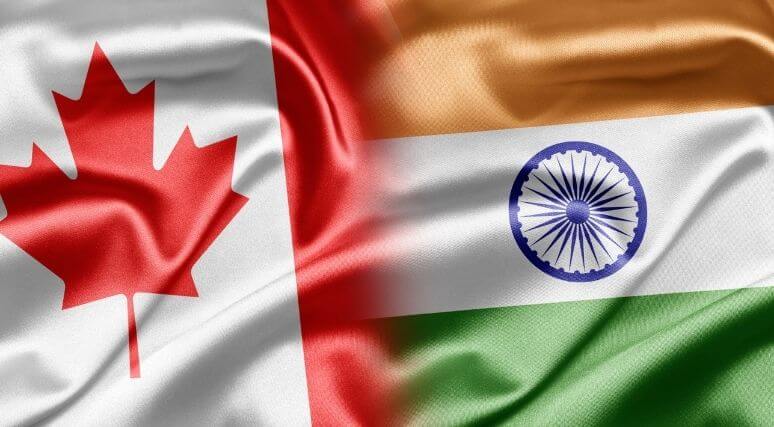 From two ends of the Pacific, our nations have a shared interest in contributing to the rise and prosperity of the Indo-Pacific region. Yet new threats stand in the way of achieving this potential, write Richard Fadden, Vikram Sood, Shuvaloy Majumdar and Sameer Patil.
From two ends of the Pacific, our nations have a shared interest in contributing to the rise and prosperity of the Indo-Pacific region. Yet new threats stand in the way of achieving this potential, write Richard Fadden, Vikram Sood, Shuvaloy Majumdar and Sameer Patil.
By Richard Fadden, Vikram Sood, Shuvaloy Majumdar and Sameer Patil, January 17, 2022
Anita Anand and Mélanie Joly’s appointments as ministers of national defence and foreign affairs presents Prime Minister Justin Trudeau with an opportunity to define Canadian interests in the Indo-Pacific. Now is the time for Canada to enhance its strategic partnership with India.
From two ends of the Pacific, our nations have a shared interest in contributing to the rise and prosperity of the Indo-Pacific region. Our potential hinges on animating supply chains enabled by trust and underpinned by the rule of law, on unlocking technological and scientific potential, and on accelerating development. It hinges on achieving energy security and clean infrastructure, combating poverty and educating billions.
First, our democracies are under attack by authoritarians who are attempting to intimidate, disinform and polarize our people. Securing our democracies from foreign interference and state-backed misinformation operations is an urgent priority. We can address this by achieving a mutual understanding of who is targeting us, their modalities, and by developing multilateral rapid response capabilities — inspired by those in Taiwan — to address them.
A second threat is the persistence of terrorism and extremism. Since the 1985 Air India terror bombing, Khalistan extremists continue to draw oxygen from authoritarians abroad. Their logic is unrooted in the facts around justice and reconciliation, and should be met by greater co-operation between both democracies.
A recent visit to Canada by members of India’s premier counter-terrorism body, the National Investigation Agency, is a welcome step toward meaningful co-operation, but much more is needed. We should look to U.S.-India counter-terror co-operation as an example, forged from confronting Pakistan’s proxy war in India, as it offers a robust and replicable template.
Internationally, emboldened Islamist extremists from within Taliban-ruled Afghanistan present real risks and common cause — Canada and India both have an interest in supporting Afghan women and girls, protecting minority Hindus and Sikhs, and opposing ethnic persecution.
Afghans are on the precipice of starving to death this winter and are in urgent need of support, without strengthening the Pakistan-backed Taliban that subjugates them. Canada and India could work together in delivering direct assistance to the Afghan people, creating a basis for greater international humanitarian co-operation.
Third, these cross-border threats are advantaged by the emergence of the darknet. The darknet enables anonymous and unlawful activities by rogue actors, from murderers to money launderers, and is a nest for extremist propaganda, fundraising and the illicit arms trade.
Experiencing a surge of illicit activities organized and disseminated on the darknet, notably narcotics smuggling and terrorist propaganda, India needs partners to provide a comprehensive understanding of the technology and the criminal activities that are facilitated by it. CSIS and Canadian security agencies have successfully participated in multinational crackdowns on darknet sites, an experience that holds significant value for our security co-operation.
Fourth, we need a broader focus on cybersecurity. We are subjected to growing and repeated attacks by malicious state actors against critical infrastructure, including the financial sector, health systems and power grids. Ransomware attacks are rapidly expanding, perpetrated by syndicates and backed by states. These nefarious activities directly compromise our security and prosperity, providing a bilateral imperative to secure our cyberspace and digital infrastructure.
Fifth, from the high seas to outer space, research into robotics and autonomous systems have created promising technologies, with tremendous potential for civilian and military collaboration between India and Canada.
This intersection of technology and security defines the strategic fault-line between the democratic and authoritarian worlds. New alliances, such as India-Israel-U.A.E.-U.S., AUKUS and the Quad, are taking shape, while new financial partnerships, such as the Blue Dot Network , are being engaged. Canada and India should launch a bilateral program that co-develops new technologies and scales them with new partners across the Indo-Pacific.
Finally, on the Line of Actual Control separating Indian- and Chinese-controlled territory, in the Himalayas, the Indian Army has been engaged in a tense standoff for over 18 months against the People’s Liberation Army.
Indian troops have acclimatized to fight in low temperatures due to persistent border raids from Pakistan and China. But China’s most recent aggression has resulted in a prolonged stalemate, and a new requirement for a sustained Indian winter presence.
Canada, with its history of military operations in the Arctic, Baltic and Afghanistan, its experience with Arctic infrastructure and ongoing requirement to expand Arctic sovereignty, can and should bring ambition to the Indian military. Through joint training exercises and Canadian defence equipment, Canada and India can emerge as true security partners.
Combined, these national security initiatives would constitute renewed ambition between two great democracies, determined to defend the values and interests defining both in the coming age. Canada’s status as a G7 and Pacific nation requires enhancing its strategic partnership with India, a vibrant democracy and rising world power. In a world of emboldened authoritarians and their designs, we must succeed.
Richard Fadden served as Canada’s national security advisor and head of the Canadian Security and Intelligence Service. Vikram Sood served as head of India’s Research and Analysis Wing. Shuvaloy Majumdar is former policy director to Canadian foreign ministers. Sameer Patil served at the National Security Council Secretariat in the Indian Prime Minister’s Office.





